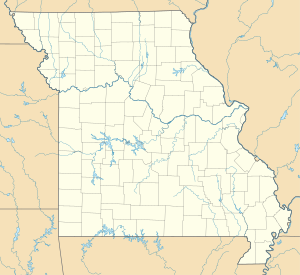Richards-Gebaur Air Force Base
| Richards-Gebaur Air Reserve Station | |
|---|---|
| Part of Air Defense Command Air Force Communications Service Air Force Reserve |
|
| Located near Kansas City, Missouri | |

Richards-Gebaur Air Force Station just after its closure, 23 March 1997, showing the Richards-Gebaur Memorial Airport shortly before its closure in 1999
|
|
| Coordinates | 38°50′39″N 094°33′19″W / 38.84417°N 94.55528°WCoordinates: 38°50′39″N 094°33′19″W / 38.84417°N 94.55528°W |
| Site information | |
| Controlled by |
|
| Site history | |
| Built | 1941 |
| In use | 1941-1994 |
Richards-Gebaur Air Reserve Station is a closed United States Air Force base. It was located 17.7 miles (28.5 km) south of Kansas City, Missouri. It was closed in 1994.
Opened in 1941 as a civil airport, Grandview Airport was used by both the Army Air Forces and the United States Navy during World War II as an overflow training airfield for Sedalia Army Airfield and Naval Air Station Olathe beginning in March 1944. The airport was acquired by the Army Air Forces Continental Air Forces, becoming an entirely military installation in February 1945. It later became a major United States Air Force base during the Cold War.
Richards-Gebaur Air Force Base was named on 27 April 1957 in honor of Kansas City natives 1st Lieutenant John Francisco Richards II (1894–1918) and Lieutenant Colonel Arthur William Gebaur Jr. (1919–1952). Lieutenant Richards's Nieuport was shot down on 26 September 1918 during an artillery surveillance mission on the last day of the World War I Meuse-Argonne Offensive.
Prior to its renaming in 1957, the facility was designated Grandview Airport from the date of its acquisition by the Army Air Forces in March 1944, then Grandview Air Force Base beginning on 1 October 1952.
The City of Kansas City built Grandview Airport (IATA code GVW) in 1941. During World War II, the United States Army Air Forces I Troop Carrier Command built a facility on part of the airfield in 1944 which was used as a sub-base for Sedalia AAF (later Whiteman Air Force Base) for overflow traffic and training uses. The United States Navy also used the airport as an Outlying Landing Field (OLF) to Naval Air Station Olathe, Kansas where aviators were trained for carrier operations.
...
Wikipedia



